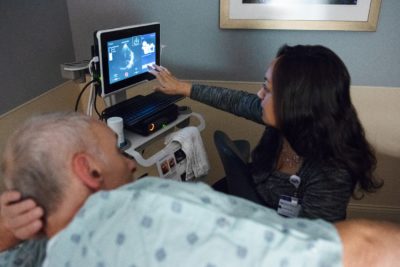Cars need smog tests. Bridges need quality inspections. And humans need health screenings, especially for the heart.
That’s because heart disease is the leading cause of death worldwide. In the United States alone, it’s responsible for about one in four deaths each year.
With deep learning, heart disease diagnosis is becoming easier and more accessible — which in turn can improve treatment and patient outcomes.
Echocardiograms — ultrasound tests that generate images of the heart — are used to detect and manage heart disease cases. An echo, as it’s commonly called, is also used as an assessment tool for specific populations, such as chemotherapy patients, because of their increased risk of heart failure.
In the United States, more than 10 million echocardiograms are performed each year. They’re typically done by registered diagnostic cardiac sonographers who go through a two-year degree program to learn how to perform them.
Bay Labs hopes that its deep learning tool, EchoGPS, will allow a nurse or other non-specialist to run diagnostic-quality echocardiograms with just a few days of training.
“We know that getting access to high-quality echo can be challenging and there are many opportunities to do echo more often,” said Shara Senior, head of product at Bay Labs. “If we can empower more clinical team members with the ability to perform an echo, it would enhance the quality of patient care.”
The startup has raised more than $9 million since its founding in 2015. In 2017, it received a $125,000 prize at the Inception competition during NVIDIA’s annual GPU Technology Conference.
Transforming Echo Capture and Analysis
When performing an ultrasound scan, a sonographer positions a probe, called a transducer, on the patient’s body to capture different images of the heart. The deep learning technology in the EchoGPS software guides non-expert healthcare providers on how to maneuver the transducer to get optimal-quality images for diagnosis.

Expanding access to high-quality echocardiograms could improve heart disease diagnosis and treatment in both traditional healthcare systems and underserved settings — resulting in better outcomes for patients and cost savings for healthcare providers.
Bay Labs has also developed an echocardiogram analysis software suite, EchoMD. It automatically chooses the highest-quality images from an echocardiogram and provides an assessment of ejection fraction, one of the metrics of cardiac function that doctors use to inform their clinical decisions.
Using convolutional neural networks, the startup’s deep learning models are trained on a database of 1 million echocardiograms from different clinical partners, including the Minneapolis Heart Institute.
A key capability of Bay Labs’ technology is real-time image processing during ultrasound capture. “That’s really only possible using NVIDIA technology,” Senior said. “We’ve gone as far as to approach our hardware provider and convince them to embed GPUs in their future devices so we can take advantage of the processing power.”
The company uses NVIDIA GPUs for training its neural networks for EchoGPS and EchoMD. The EchoGPS software runs on an NVIDIA Quadro P3000 GPU embedded into an ultrasound machine for real-time inference.
Deep Learning Echocardiograms in the Field
EchoMD received FDA clearance in June. Preparation for FDA clearance of EchoGPS is underway, with the tool currently available only for investigational use, and a major clinical trial in the offing.
The startup recently launched a clinical study with Northwestern Medicine, in Chicago, to determine whether certified medical assistants with no prior scanning experience can capture high-quality echocardiograms with EchoGPS. The study includes 1,200 patients over the age of 65, and will also test the EchoMD analysis suite for detecting certain types of heart disease.
The company will also bring EchoGPS to two district hospitals in Rwanda later this month, part of a mission with Team Heart — a local nonprofit medical organization — to expand sustainable cardiac care in the country.
In the East African country, Bay Labs will demo its ultrasound software, including an investigational algorithm to detect rheumatic heart disease. It’s a condition that affects 32 million children and young people worldwide.
Stemming from inadequately treated strep throat, this acquired heart disease can inflict serious damage and has a high mortality rate, estimated at 275,000 persons per year globally.
“Rheumatic heart disease is rarely seen in developed countries. It is known as a disease of poverty,” Senior said. Risk factors for the disease are overcrowding, lack of nutrition and poor hygiene.
However, if detected early, rheumatic heart disease can be easily treated.